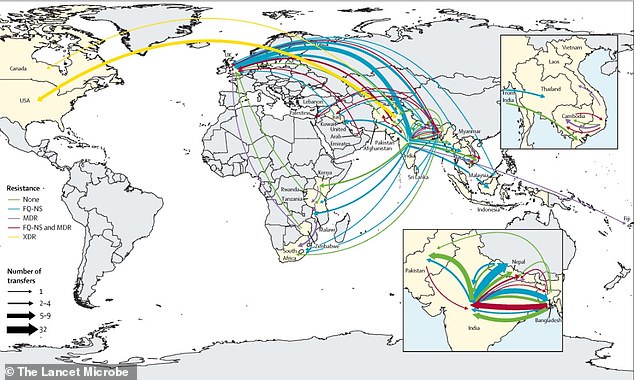An ancient killer has become all the more dangerous with time, mutating often to better sidestep medications.
The bacterium that causes typhoid fever, Salmonella enterica serovar Typhi (S Typhi), has evolved to resist common antibiotics.
In 2022, a group of researchers from around the world identified more than 4,000 strains obtained from blood samples from over 70 countries as extensively drug-resistant (XDR) Typhi.
Drug-resistant strains have spread from country to country around 200 times since 1990. People infected with resistant typhoid carry it to new countries, while the global food trade spreads resistant bacteria to dense cities with poor sanitation accelerates the spread.
Researchers warned that the most commonly used antibiotics, including Ampicillin, Chloramphenicol, and Azithromycin, may not save patients’ lives like they used to.
Approximately 5,700 Americans become ill each year, and 620 are hospitalized. Deaths from typhoid fever in the US are very infrequent.
Dr Jason Andrews, a specialist in infectious diseases at Stanford University and lead author of the report, said the breakneck pace at which S. Typhi is spreading ‘is a real cause for concern.’
Typhoid fever sickens 11million people every year, causing fever, abdominal pain, and, if left untreated, intestinal bleeding and sepsis. It kills about 100,000 people annually.

Our study found resistant typhoid crossed borders 197 times since 1990 – mostly within South Asia, and spreading to Africa and beyond
Around one in five people who are not treated for typhoid will die.
When the genes of a strain of bacteria mutate to resist antibiotics, doctors have far fewer treatment options when patients present with typhoid symptoms.
Researchers analyzed the genetics of over 7,600 samples of S. Typhi, including 3,489 samples from individuals with typhoid in Bangladesh, India, Nepal, and Pakistan from 2014 to 2019.
They also looked at 4,169 older samples from more than 70 countries, some dating back to 1905.
They pored over the bacteria’s genetic blueprint to identify genes that can change the bacterial protein that antibiotics usually attack.
This causes the bacteria to make enzymes that break down the drug, eject antibiotics before they work, or use alternative biochemical pathways.
The team warned that typhoid-causing bacteria are mutating so rapidly that modern medicine can’t keep up, stating that by the time scientists decide to use vaccines based on today’s resistance data, it may already be too late.
South Asia is a hotspot where resistance continues to develop and then spreads globally.

Approximately 5,700 Americans become ill each year, and 620 are hospitalized. Deaths from typhoid fever in the US are very infrequent (stock image)
Since 1990, strains resistant to the antibiotic class quinolones have evolved independently at least 94 times, with 97 percent of these cases originating in South Asia, specifically in countries such as India, Pakistan, Bangladesh and Nepal.
What began as localized resistance, affecting 85 percent of Bangladeshi typhoid cases by the early 2000s, exploded across the region, surpassing a 95 percent prevalence in India, Pakistan, and Nepal within a decade.
The pattern repeats with newer drugs. Azithromycin resistance has emerged seven times since 2003, with Bangladeshi strains steadily proliferating since 2013, while resistance to last-line antibiotics cephalosporins now looms as the next frontier in the escalating crisis.
While these strains most often occur within South Asia and spread from there to Southeast Asia, East Africa, and Southern Africa, they have also been reported in the US, UK and Canada.
Dr Andrew said: ‘The fact resistant strains of S. Typhi have spread internationally so many times also underscores the need to view typhoid control, and antibiotic resistance more generally, as a global rather than local problem.’
The research was published in The Lancet Microbe journal.
Typhoid is rare in the US, and cases typically arise after a person has traveled internationally.
It primarily affects people in areas with poor sanitation, and children under five are more susceptible.
In 2018, a Massachusetts daycare center temporarily closed after a child was diagnosed with typhoid, likely contracted during recent international travel.
Typhoid fever spreads through fecal-oral transmission, meaning people ingest the bacteria Salmonella Typhi from food, water, or surfaces that have come in contact with fecal matter, such as eating food handled by someone with typhoid who didn’t wash their hands after using the bathroom.
The study has some gaps that need to be considered.
Researchers lacked sufficient genetic data from key regions, particularly parts of Africa and Oceania, where typhoid is prevalent. Without more samples from these areas, it is more difficult to track how and when resistant strains spread.
Even in countries with better monitoring, most samples are collected from just a few locations, which may not accurately reflect what is happening elsewhere.
And since only a small fraction of typhoid cases get genetically tested, the true scale of antibiotic resistance and global spread is probably even worse than the numbers show.
Researchers said THIS highlights the need ‘to expand genomic surveillance to provide a more comprehensive window into the emergence, expansion, and spread of antibiotic-resistant organisms.’






